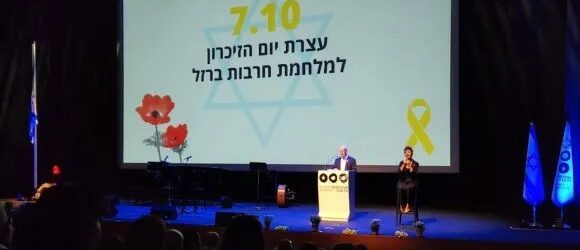TAU marked one year since the October 7 tragedy and the Iron Swords War.
A year has gone by since Israel went through the most terrible calamity in its history, the Jewish people’s worst disaster since the Holocaust. A year has passed, and 101 hostages are still held by Hamas in the dreadful tunnels of Gaza, with no rescue in sight. A year has passed, and almost every day we hear of more soldiers killed or wounded. A year has passed, and most evacuees, from the north and south of Israel, are still refugees in their own land. A year has passed since that horrible Saturday, and as time goes by we discover that very few of those accountable for the bloody fiasco are willing to take responsibility.
Tel Aviv University has lost 19 of its students. 96 families from the TAU community have lost immediate family members. Many more suffer physical or psychological harm. In the coming academic year, we will receive—with great awe—many students who have risked their lives so that we may live. Some of them have been deeply scarred in their bodies or souls. We will do everything we can to help them, so that they can successfully study and complete the academic year. We are forever indebted to them for their courage and sacrifice.
In the past year, it seems, we have all swayed constantly between hope and despair. So, I wish to speak to you of some truths that, despite the numerous challenges, arouse real hope in my heart:
The first is the exceptional personal quality of so many Israelis, especially the younger generation. Over the past year we have discovered in our society a strength we never knew we had. Even though we disagree on many issues, at the moment of truth we stand together, and do what must be done so that we can continue to live in our land.
The second truth is our military power, backed by outstanding technological capabilities. To be sure, military power is a means, not an end. And yet, in our part of the world, we probably could not exist without it. Despite their horrendous failure a year ago, Israel’s army and other security forces have been able to recover from the terrible blow and show the world that Israel is not defeated. Military power bolstered by innovative technology is the only way to keep our enemies deterred. And this advantage, we must remind anyone who needs reminding, cannot be attained or preserved without a powerful academia. We can only hope that in the future our country will choose a path in which diplomatic solutions, not only daunting military force, ensure our continued existence.
The third truth is the somewhat surprising resilience of Israeli democracy, with its institutions and civic society organizations. Without going into political controversies, I will just say that I believe that Israeli democracy, despite the cracks it has incurred, is still very strong. Anyone who believes in Israeli democracy should also believe that it will produce upstanding leaders who will lead us on the right path.
I cannot speak of hope without touching on the terrible despair of the families of our hostages in Gaza. We cannot embark upon a new path of recovery, revival and hope without bringing the hostages back to their homes. Many of us are deeply concerned that the state of Israel might not be doing everything in its power to achieve this. Freeing the hostages – who were abandoned to their fates in the dreadful fiasco of Oct. 7 – is not only a moral obligation. It is a strategic goal of the highest importance. Anyone who has served in the Israeli army is familiar with the ethos: you do not leave an injured brother-in-arms behind. Moreover, the Redemption of Captives, “pidyon shvuyim,” is an all-important Jewish commandment. Without this ethos, without solidarity as a paramount value, the state of Israel will never be the same again.
Many of us were born to parents or grandparents who came to this land before the state of Israel was established. They fought to make it a reality. Now our time has come to do whatever we can to protect this land, each in his or her own way, each according to his or her abilities.
